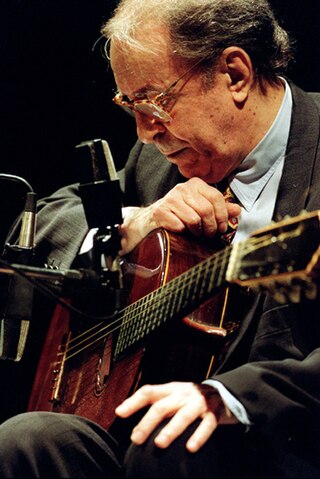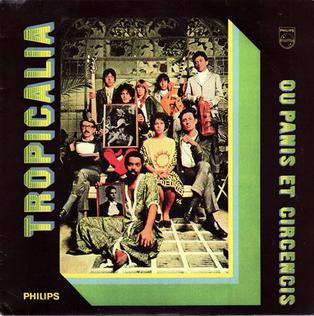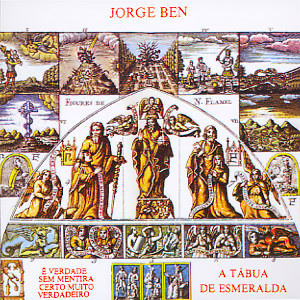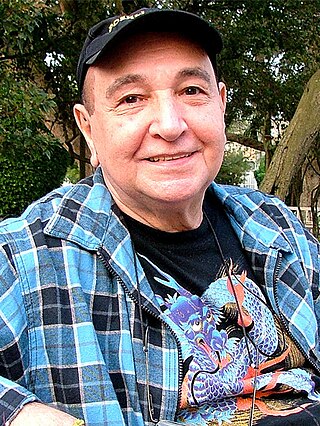
Caetano Emanuel Viana Teles Veloso is a Brazilian composer, singer, guitarist, writer, and political activist. Veloso first became known for his participation in the Brazilian musical movement Tropicália, which encompassed theatre, poetry and music in the 1960s, at the beginning of the Brazilian military dictatorship that took power in 1964. He has remained a constant creative influence and best-selling performing artist and composer ever since. Veloso has won nine Latin Grammy Awards and two Grammy Awards. On 14 November, 2012, Veloso was honored as the Latin Recording Academy Person of the Year.

Gilberto Passos Gil Moreira, is a Brazilian singer-songwriter and politician, known for both his musical innovation and political activism. From 2003 to 2008, he served as Brazil's Minister of Culture in the administration of President Luiz Inácio Lula da Silva. Gil's musical style incorporates an eclectic range of influences, including rock, Brazilian genres including samba, African music, and reggae.

Francisco Buarque de Hollanda, popularly known simply as Chico Buarque, is a Brazilian singer-songwriter, guitarist, composer, playwright, writer, and poet. He is best known for his music, which often includes social, economic, and cultural reflections on Brazil.

João Gilberto was a Brazilian guitarist, singer, and composer who was a pioneer of the musical genre of bossa nova in the late 1950s. Around the world, he was often called the "father of bossa nova"; in his native Brazil, he was referred to as "O Mito" . In 1965, the album Getz/Gilberto was the first jazz record to win the Grammy Award for Album of the Year. It also won Best Jazz Instrumental Album – Individual or Group and Best Engineered Album, Non-Classical. Nominated at the Grammy 1978 in the category Best Jazz Vocal Performance, album Amoroso, and winner category in Grammy 2001 with João voz e violão Best World Music Album.

Getz/Gilberto is an album by American saxophonist Stan Getz and Brazilian guitarist João Gilberto, featuring pianist and composer Antônio Carlos Jobim, who also composed many of the tracks. It was released in March 1964 by Verve Records. The album features the vocals of Astrud Gilberto on two tracks, "Garota de Ipanema" and "Corcovado". The artwork was done by artist Olga Albizu. Getz/Gilberto is a jazz and bossa nova album and includes tracks such as "Desafinado", "Corcovado", and "Garota de Ipanema". The last received a Grammy Award for Record of the Year and started Astrud Gilberto's career. "Doralice" and "Para Machucar Meu Coração" strengthened Gilberto's and Jobim's respect for the tradition of pre-bossa nova samba.

Rita Lee Jones was a Brazilian singer, songwriter, multi-instrumentalist, presenter, actress, writer, and activist. Known as the "Queen of Brazilian Rock," she sold more than 55 million records, making her the most successful female artist by record sales in Brazil and the fourth overall, behind Tonico & Tinoco, Roberto Carlos, and Nelson Gonçalves. She built a career that started with rock but over the years flirted with various genres, such as psychedelia during the Tropicália era, pop rock, disco, new wave, pop, bossa nova, and electronic, creating a pioneering hybrid between international and national genres.

Gal Maria da Graça Costa Penna Burgos, known professionally as Gal Costa ( ), was a Brazilian singer of popular music. She was one of the main figures of the tropicalia music scene in Brazil in the late 1960s and appeared on the acclaimed compilation Tropicália: ou Panis et Circencis (1968). She was described by The New York Times as "one of Brazil's greatest singers."

Maria Bethânia Viana Teles Veloso is a Brazilian singer and songwriter. Born in Santo Amaro, Bahia, she started her career in Rio de Janeiro in 1964 with the show "Opinião" ("Opinion"), she is "The Queen of Brazilian Music". Due to its popularity, with performances all over the country, and the popularity of her 1965 single "Carcará", the artist became a star in Brazil.

Tropicália ou Panis et Circencis is a 1968 collaboration album by artists including Gilberto Gil, Caetano Veloso, Tom Zé, Nara Leão, Os Mutantes and Gal Costa. Considered an important record in the Tropicália movement and in the history of Brazilian music, it features orchestral arrangements by Rogerio Duprat and lyrical contributions from Torquato Neto.

A Tábua De Esmeralda is the 11th studio album by Brazilian singer-songwriter and guitarist Jorge Ben. It was released in 1974 by Philips Records.

João Donato de Oliveira Neto was a Brazilian jazz and bossa nova pianist as well as a trombonist from Rio Branco. He first worked with Altamiro Carrilho and went on to perform with Antonio Carlos Jobim and Astrud Gilberto. Because of the area he grew up in Brasil he was able to hear Cuban music on the radio. This influence would manifest itself in many of his compositions, piano, and trombone playing. Donato's most well-known compositions include: "Amazonas", "Lugar Comum", "Simples Carinho", "Até Quem Sabe" and "Nasci Para Bailar".

Doces Bárbaros is a 1976 album by the Música popular brasileira supergroup of the same name. It was recorded June 24 of that year at Anhembi Stadium in São Paulo. Its members were Gilberto Gil, Caetano Veloso, Maria Bethânia and Gal Costa, four of the biggest names in the history of the music of Brazil. The band was the subject of a 1977 documentary directed by Jom Tob Azulay. In 1994, they performed a tribute concert to Mangueira school of samba.

Gil e Jorge is a 1975 album featuring collaboration between Brazilian musicians Jorge Ben and Gilberto Gil. The two perform together alongside percussionist Djalma Corrêa on each of the songs, improvising and interacting directly throughout. The album was released in Brazil under the title "Ogum Xangô" with a different cover.

Gilberto Gil (also commonly referred to as Gilberto Gil (Frevo Rasgado) to differentiate it from Gil's other self-titled releases) is the second studio album by Gilberto Gil, originally released in early 1968. The album features a blending of traditional Brazilian styles such as samba and bossa nova with American rock and roll. It also mixes Rogério Duprat's orchestral arrangements with the electric guitars of Brazilian rock group Os Mutantes.
The discography of Brazilian singer Maria Bethânia consists of 34 studio albums, 15 live albums, several participations in movie and telenovela soundtracks as well as numerous collaborations with other artists.

Gilberto Gil is the third solo album by Gilberto Gil, originally released in 1969. The album was arranged by Rogério Duprat, and has a strong element of psychedelic rock to it, being considered by some to be his most experimental album. Since Gil was not allowed by the Brazilian military dictatorship to leave Salvador, Bahia, before being exiled to London, he recorded vocals and acoustic guitar in Salvador, and Rogério Duprat recorded the other instruments in Rio de Janeiro and São Paulo.

Cantar is the fifth solo album by the Brazilian singer Gal Costa, released in 1974. It was ranked the 91st best Brazilian album of all time by the Brazilian Rolling Stone magazine.

Karoline dos Santos Oliveira, known professionally as Karol Conká, is a Brazilian singer-songwriter. Her music is a blend of modern hip-hop and rap with sounds from Brazilian pop and traditional music.
Alexander Gordin, better known as Lanny Gordin, was a Brazilian guitarist and composer who collaborated with artists such as Gal Costa, Gilberto Gil and Caetano Veloso, among others.
















